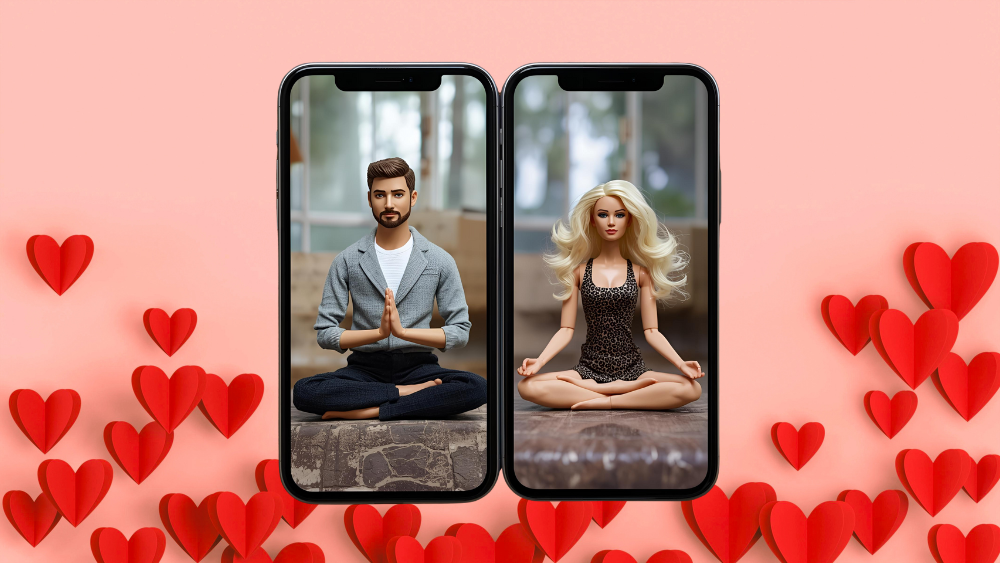The Problem with Dating Apps
It’s important to remember that dating apps are available for free to anyone who downloads them, or at least they have a free version, and they belong to business giants such as Match.com. Each app, therefore, is a capitalist product. These companies didn’t create them to save the world or help us find love (even if some began with that ideal), but to profit from those willing to pay.
Their goal is to keep us using the apps, just like social media platforms are designed to do. The only difference is that when you add the possibility of finding love, the platform becomes even more irresistible. They use gamification elements such as swiping, matching, challenges, and badges that mimic casino games like slots or fruit machines. This creates an addictive environment that’s difficult to walk away from.
How to Use Dating Apps Mindfully
First, we need to shift our mindset around dating apps. We must let go of the stigma that says, “If I need to use dating apps, something’s wrong with me, so I feel ashamed and use them secretly.” Ironically, that guilt fuels problematic use.
Next, it’s best to go into apps with a clear intention. Know why you’re there, don’t just download Tinder out of boredom. Don’t see apps as a game but as a tool.
We need to observe ourselves and the moments when we feel the urge to open an app, whether it’s to create a profile or simply to do some swiping during the day. If you just broke up with someone two hours ago, it’s not the best time. If you’re feeling low, lacking confidence, and craving a dopamine hit (even though that’s when most people fall into the trap), again, not the best time.
As I often tell my clients, your dating app profile is to your romantic life what LinkedIn is to your professional life. Take it seriously, put time and energy into it, but use it wisely.
For example, set your own boundaries on how long you spend on apps each day (unless you’re in a flowing conversation with someone specific). Otherwise, avoid staying on them for more than 20–30 minutes a day. Do your swiping, filter potential matches, send one or two messages, and log off.
Note: When (straight) women first join apps, the number of incoming matches can be overwhelming. They often end up going on three, four, or even five dates per week during the first month, which leads to burnout, as dating can be emotionally draining. The result? They delete the app, only to reinstall it later when they get bored again and need validation. To avoid this cycle, moderation and discernment are key.
Dating & Attachment Styles
Modern ways of meeting people and new technologies have changed our romantic landscape, and therefore, the kind of emotional support people now need in dating.
For example, anxious types (who are often women) tend to circle around the existential question: “Why am I not being chosen?” They often find themselves trying to “fix” situations that are not meant to be fixed, starting from the foundational anxiety of “Why isn’t he texting me?”
There’s a strong connection between anxious attachment and emotional burnout from excessive app use, something more common among women. On the other hand, men often experience rejection sensitivity, which can lead to lower self-esteem.
Core Beliefs & Dysfunctional Patterns
Everything related to mental health is also related to dating, because everything we are, everything we’ve lived through, and everything we carry inside us is projected onto our romantic and relational field and onto every partner or potential partner.
The need for connection and all our efforts that stem from it, even through a series of relationships that didn’t go well or experiences we labeled as “failures”, they all play an essential part in a process we can’t understand until we see it looking backwards. Even while we may be suffering deeply, something essential is being transformed.
This process mirrors our behavioral patterns, the roles we play in relationships, how we interpret situations, what we keep doing (even when it doesn’t work), and how we can change it using the right tools.
The goal is to become aware of why we do what we do, to feel compassion for ourselves for having developed these protective coping mechanisms, and even admiration for our own inventiveness. Then comes the stage of taking responsibility and stepping into maturity.
The real challenge is to rediscover and gently return to our authentic, wise self, the one who doesn’t fear, doesn’t feel threatened, and therefore no longer needs to act in the same self-protective ways. That’s the level where true healing happens.
If you’d like to explore how to manage situations that affect you negatively during dating or new relationships, I’m here to help. Fill out the form, and I’ll get in touch!
